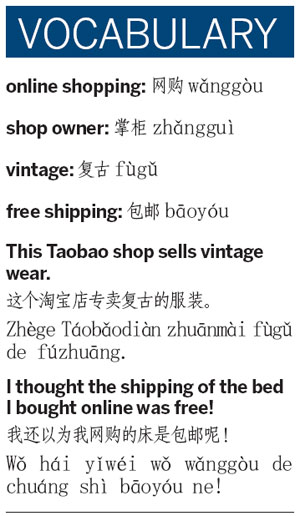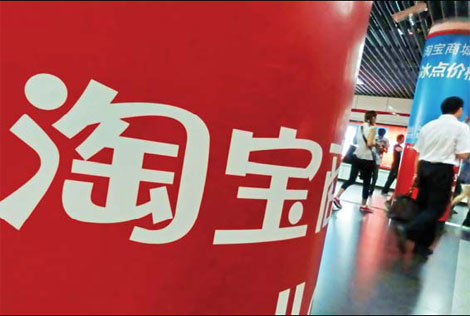Art's latest patron
Updated: 2012-04-13 07:43
By Kris Bartkus (China Daily)
|
||||||||
|
Taobao has cemented its position as the top dog in China's online retail market. [Jing Wei / For China Daily] |
How a chinese online giant is helping to breed a new generation of creative entrepreneurs
对于白手起家的创意青年来说, 淘宝网是个福音.即使你是老外, 也可以当掌柜.
William grew up between Hong Kong and Guangzhou, helping operate his family's suit export business. It was this that gave him a sharp eye both for fashion and for business - and that in 2008 gave him an idea: "I saw that a lot of Chinese girls started wearing leggings, especially leggings with prints." This was all the spark William needed. Soon he had opened up his very first Taobao store, in an effort to bring his family's brick-and-mortar operation into the 21st century.
At the time, it might have seemed like he was late to the party. Founded in 2003, Taobao had already cemented its position as the leader in China's online retail market. Though it's widely compared to eBay, Taobao forgoes auction-style selling in favor of virtual stores.
In the years since William's leggings emporium broke online ground, Taobao has grown from 99 million to 370 million users, and is now the 15th most visited site in the world, ahead of Amazon or eBay.
Looking back, none of this surprises William. "A physical store would have cost 50,000 yuan ($7,930, 6,040 euros) to set up, and 15,000 yuan a month to run. A Taobao store is free."
There are no leases to sign, government offices to visit or taxes to pay. Taobao does not even take a cut of the seller's revenue. And having access to one of the world's cheapest and fastest delivery networks has not hurt either: "I could ship from Shenzhen to Beijing, in 24 hours, for under 10 yuan," William says.
In the United States, that kind of luxury would run an eBay seller more than $50.
With one registered Taobao user per four Chinese citizens, the Taobao revolution has reached beyond businessmen like William, who closed his original shop and plans to open another one, with an office and sales staff.
Increasingly, Taobao's plug-and-play brand of entrepreneurship is being picked up by Chinese youth - especially artists, who crave the flexibility it offers.
Business for art
 |
With her sleek bowl haircut and over-the-top dress, Candy Monster vocalist Bianbian looks like a Chinese Karen O. In her tiny studio apartment where we met, the only signs of Bianbian's stage persona were an easy confidence and the flaming Soviet star tattoo on her shin.
Bianbian moved to Beijing from a small northeastern town in 2007, looking for rock and roll - along with its less charming cousin, work.
"I worked as a shop assistant, but the hours didn't let me rehearse," she says. "I tried opening a small clothing store in Wudaokou, but online sellers undercut our prices until we went bankrupt."
After six months of unemployment, she turned to Taobao.
Yolin Life, Bianbian's store, is a modern marvel. A crack civil engineering team could not squeeze the store's 8,000 products into Bianbian's sliver of real estate - and luckily, they do not need to. Beyond checking samples for quality, Bianbian never sees the products.
Place an order on Yolin Life, and it will be relayed to a supplier, who ships the product to you. The whole operation is run from her computer.
The product overload is not accidental (or anomalous among Taobao stores). Speed, according to Bianbian, is everything, and that includes adding new products.
"Some weeks, we're updating the store daily with dozens of new products," she says. Replying quickly to customer requests is also paramount. Customers frequently use Taobao's messaging system, Ali Wangwang, to ask for information, discounts or liwu (礼物, gifts).
Everyone I interviewed cited the feature as a great asset for customers, though it handcuffs sellers.
"If you're not online to answer questions immediately, 80 percent of your sales will disappear," says Bianbian.
Still, the burden comes with rewards. Bianbian runs the store with her boyfriend, and their combined labors, which they estimate at four to five hours a day, net them about 2,000 yuan a month. In office jobs, they guess they could each earn 3,000 yuan, but the money could not compensate for the lost time.
With Taobao, Bianbian can schedule her work hours freely around the demands of her band. There is only one constant: "If we work less, we earn less."
Business as art
Nicole's skinny jeans and demure expression could place her at a hip bar anywhere in the world. A product of Hong Kong, she moved to Beijing with her band, the Offset: Spectacles, in search of cheap rents and a livelier indie scene (one of which she found).
"Hong Kong made me feel dry and exhausted," she says. "I had no energy for what I wanted to do."
Nicole shares a small two-story hutong apartment with two cats. I followed her as she lugged a suitcase up the stairs. Inside it are some of the products she sells on her store, Rose Mansion.
Sitting on the floor of her sun-soaked veranda, we inspected the goods. These included vintage leather handbags and clothes (many from her family in Hong Kong), earrings she hand-makes from plastic party favor toys and self-published books she helps her friends sell.
This is a far cry from the way Nicole started out. "First I tried selling regular clothes, but there was too much competition, so I tried to specialize. I did vintage."
Over time, Rose Mansion has evolved from a source of income to a creative outlet. "Some shops on Taobao are like supermarkets. They sell what people need, and with great service. But that's not what I'm into," she says. "Rose Mansion is my space."
Curating that space involves searching for products, marketing and maintaining her blog, where new products mingle with photos of home-cooked pasta, quotes from books and a doodle of Napoleon Dynamite.
These days, Nicole does not draw a line between her business and her art. Her store shares its name with Rose Mansion Analog, a vinyl-and-cassette indie label that she co-runs. And, unlike Bianbian, Nicole integrates her store with the music community she is a part of, often going "offline" to run sales booths at music shows.
"I believe in vintage and DIY. It's more interesting, and it's better for the environment. The community in Beijing is small, but slowly growing. My store is a part of that."
Not that Rose Mansion is purely a product of goodwill. "If I work really hard, I can earn 5,000 yuan in a month."
Business as China
Taobao has revolutionized not just Chinese retail, but the lives of thousands of young people like Bianbian and Nicole. A recent report found that almost 600,000 Chinese under the age of 32 run Taobao stores, and that the chance to control their own time was their most frequent motivator.
And as Taobao shapes Chinese youth, they in turn shape Taobao. What lies in store for this relationship?
William waxes the most hopeful: "When I was a child in Hong Kong, there were all these little stores, each selling their own product. Now, it's all strip malls. Taobao is also commercial, but it gives opportunities for young people to sell interesting things. Maybe one day it can bring back that old-time feeling, like a big Sunday market on the Internet."
Courtesy of The World of Chinese, www.theworldofchinese.com
The World of Chinese

 Relief reaches isolated village
Relief reaches isolated village
 Rainfall poses new threats to quake-hit region
Rainfall poses new threats to quake-hit region
 Funerals begin for Boston bombing victims
Funerals begin for Boston bombing victims
 Quake takeaway from China's Air Force
Quake takeaway from China's Air Force
 Obama celebrates young inventors at science fair
Obama celebrates young inventors at science fair
 Earth Day marked around the world
Earth Day marked around the world
 Volunteer team helping students find sense of normalcy
Volunteer team helping students find sense of normalcy
 Ethnic groups quick to join rescue efforts
Ethnic groups quick to join rescue efforts
Most Viewed
Editor's Picks

|

|

|

|

|

|
Today's Top News
Chinese fleet drives out Japan's boats from Diaoyu
Health new priority for quake zone
Inspired by Guan, more Chinese pick up golf
Russia criticizes US reports on human rights
China, ROK criticize visits to shrine
Sino-US shared interests emphasized
China 'aims to share its dream with world'
Chinese president appoints 5 new ambassadors
US Weekly

|

|







